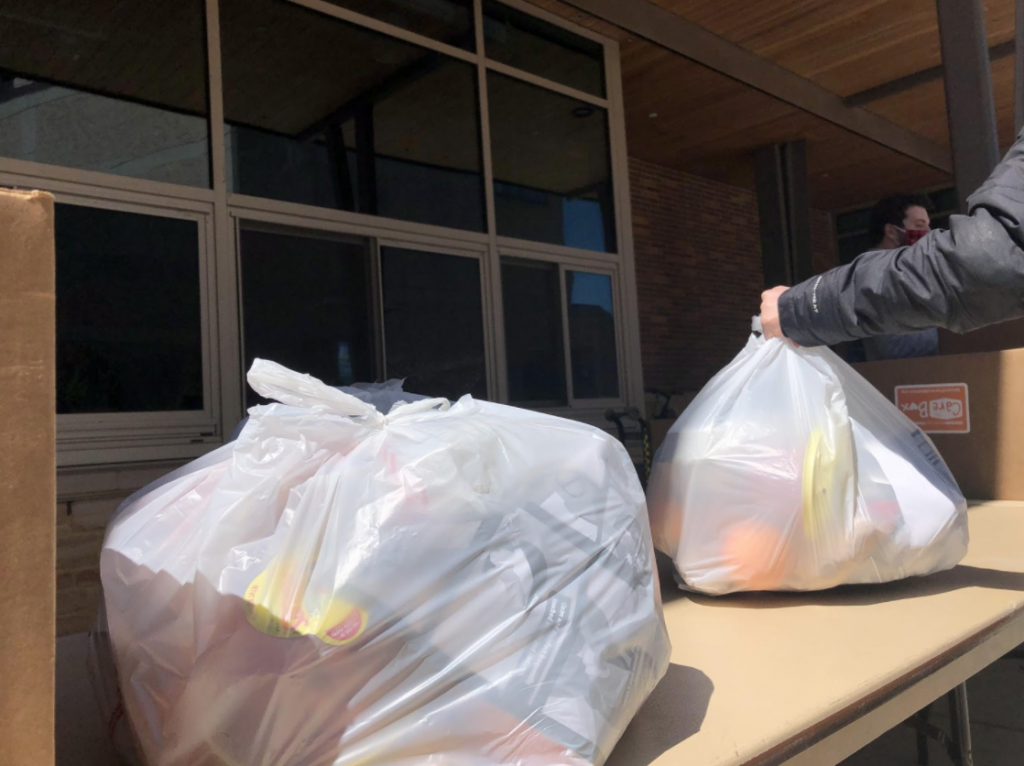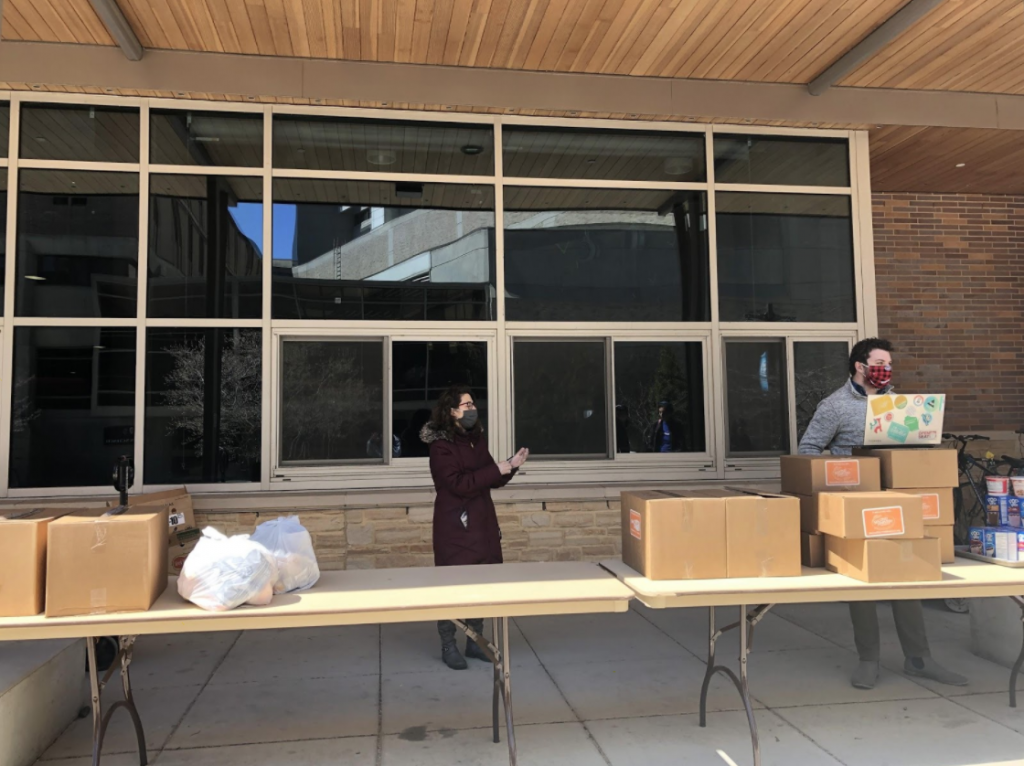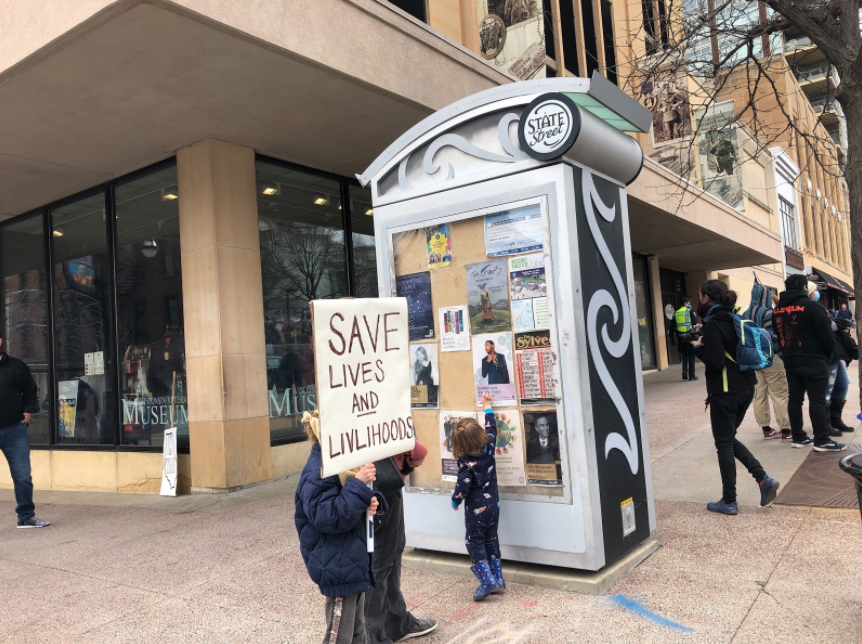Rising demand, lower donations and higher stakes: How food pantries are keeping people fed during the pandemic

A line forms in front of two folding tables outside Union South. It looks like a typical campus event, only there is no one else around and the people behind the table are wearing face masks– these students aren’t selling posters or asking you to sign up for their org, they’re giving out pre-packaged bags of groceries.
Open Seat used to operate out of the Student Activity Center feeding around 2,000 University of Wisconsin students a month, but COVID-19 has changed everything.
The SAC, along with all other campus buildings, has been closed. Zoey Dlott, UW senior and Internal Director for Open Seat, said they have started distributing a virtual order form where students can sign up to receive a bag of pre-packaged groceries that they can then pick up outside Union South from noon to one every Tuesday.
Students are instructed to stand six feet apart from one another and Open Seat workers wear masks and gloves at all times. The prepackaged bags are donated by Second Harvest Foodbank, southwestern Wisconsin’s largest hunger-relief charity.
In Wisconsin, these food resources are essential as about 1 in 10 households in Wisconsin were food insecure before the pandemic, according to the Wisconsin Food Security Project. However, COVID has led to a spike in demand and a drop in donations, forcing Second Harvest to purchase more of its food directly.
Michelle Orge, Second Harvest’s CEO, said that in the 20 years she has worked with food banks she has never seen a situation as bad as COVID.
“As food bankers we’re just used to trying to fix everything.” Orge said. “But I don’t know if we’re built for this. It’s pretty big and we’re doing a great job and we’re keeping up to some extent, but it’s gonna take more resources to do what we want to do.”

Second Harvest is a member foodbank of Feeding America, the nation’s largest domestic hunger-relief organization. Feeding America reported that almost all 200 food banks in their network have experienced a spike in demand, yet nearly 60% are facing reduced inventory levels.
Orge said Second Harvest is now distributing more than double the amount of food, despite a decrease in donations.
Because of this increased need Second Harvest has had to focus all of their resources on their Mobile Pantries. These pantries travel across southwestern Wisconsin, though some days they run out of their pre-packaged boxes before everyone has been fed. Orge said that hearing someone had to be turned away is “the worst possible news.”
Second Harvest is not the only food resource that has had to drastically change the way it functions. Barb Luedke, food pantry coordinator for the Keep, a pantry providing food for local students, faculty members and staff, said they had to move their operations from the basement of Luther Memorial Church to the sidewalk out front.
The Keep also receives their donations from Second Harvest, meaning they have made the shift from self-selection to pre-packaged bags.
The Keep gives out 10 lb bags every Thursday afternoon, including non-perishables as well as produce and dairy products when they can get them. So far they have had enough food for everyone who shows up, though Luedke said the situation changes day-to-day.
“The word is flexible these days,” Luedke said. “Everything is subject to change is the second term we hear so often.”
Both Second Harvest and the Keep have had to operate with less volunteers as many have been asked to stay home due to their advanced age and therefore, increased vulnerability to COVID-19.
According to Feeding America, member food banks across their network have shown nearly a 60% decrease in volunteers. Orge said that due to this decrease, Second Harvest has hired 15 laid off service workers as additional temporary staff, another unforseen added cost.
While some food resources are scrambling to meet the growing need, others have had to stop operating entirely.
The Campus Food Shed, a student organization working to address campus food insecurity and reduce food waste, had to shut down mid March.
The Food Shed stocks a fridge in the SAC with unsellable food from Fresh Madison Market and Madison Sourdough. This food is available to any student for free. Now that the SAC is closed, they have had to stop.
Kayva Ayalasomayajula, a junior at UW and Campus Food Shed team member, said she is worried about the impact this loss of food will have on students, as according to a study published by the College and University Food Bank Alliance, one in five students in the U.S. identifies as food insecure.
“Many students are out of jobs so they’re more worried about paying their rent than buying fruits and vegetables,” Ayalasomayajul said. “Nutrition is so important for mental health and immune functioning, that’s something that we’re worried about especially because it’s already such a stressful time.”
This rise in unemployment is impacting food pantries across the country. According to the Wisconsin Department of Workforce Development, the number of unemployment applications filed on March 30th was 24,664, more than 20 times the amount filed on this date last year.
According to Feeding America, this rise in unemployment paired with school closures could result in an estimated 46% increase in the number of people experiencing food insecurity nationally.
Dlott said Open Seat is prepared to serve this potential increase in hungry students. That if campus reopens this fall they will be able to double the amount of food they order each week.
“The pandemic has impacted everyone in a different way but what a lot of people don’t understand is that the pantry is how most students who use the pantry normally get the majority of their food,” Dlott said. “With people being out of jobs… it makes now even more important than ever that we provide this service.”
Dlott and Luedke urged those who are financially able, to donate money to Second Harvest, and those who are healthy, to volunteer.
Orge said that without their current volunteers and donations they would not be able to stay open. Second Harvest and other local food resources will continue to need this community support, because as Orge said, the demand will not be going away anytime soon.
“Don’t forget about us once this subsides because we’re still gonna be here feeding people and even more people than we’ve fed before,” Orge said, “It’s not gonna be over when it’s over for people who are still food insecure.”

